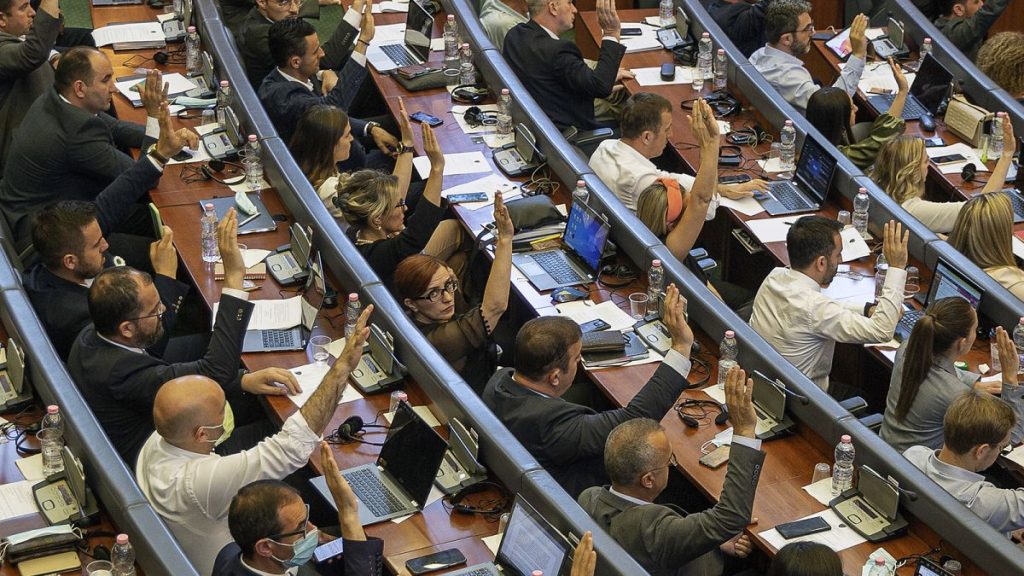The political landscape of Kosovo is bracing for a potentially turbulent period as the nation heads towards parliamentary elections on February 9th. The upcoming elections represent a significant test for Prime Minister Albin Kurti and his governing party, which secured a landslide supermajority in the 2021 elections. However, the pre-election period has been marked by controversy surrounding the participation of Srpska Lista, the dominant political party representing the Serb minority in Kosovo. The Central Election Commission’s decision to bar Srpska Lista from contesting the elections has injected an element of uncertainty and potential instability into the electoral process.
The crux of the issue lies in Srpska Lista’s perceived challenge to Kosovo’s statehood. Members of the election commission’s verification body cited the party’s consistent use of the term “Kosovo and Metohija,” a designation favored by Serbia which implies that Kosovo remains a Serbian province, undermining Kosovo’s declared independence in 2008. Further fueling concerns were Srpska Lista’s public pronouncements of loyalty to Serbia, coupled with their close ties to Serbian President Aleksandar Vučić, a staunch opponent of Kosovar independence. These factors led the commission to conclude that Srpska Lista’s participation in the elections would be incompatible with the principles of Kosovar sovereignty.
The decision to exclude Srpska Lista carries profound implications for the delicate ethnic balance within Kosovo. The Kosovar constitution guarantees reserved seats in the legislature for minority groups, ensuring their representation and protection. Srpska Lista’s absence from the ballot could disenfranchise a significant portion of the Serb minority, potentially exacerbating existing tensions and hindering efforts towards inter-ethnic harmony. While the precise percentage of the population represented by the Serb minority is debated, it’s generally estimated to be around 5%, a demographic with significant political and social weight.
The legal and political ramifications of the commission’s decision are still unfolding. Srpska Lista has the option to appeal the decision through various legal channels, including the Central Election Commission’s appeals panel and the Supreme Court. The outcome of these appeals will significantly impact the shape of the upcoming elections and the future political representation of the Serb minority. Regardless of the legal outcome, the controversy surrounding Srpska Lista’s participation has already heightened tensions between Kosovo and Serbia, jeopardizing the ongoing efforts by the international community to normalize relations between the two countries.
The historical context of the Kosovo-Serbia relationship adds another layer of complexity to the current predicament. Kosovo, formerly a Serbian province, declared independence in 2008 following a period of conflict and NATO intervention. While many Western nations, including the US and several EU members, recognized Kosovo’s independence, Serbia continues to claim Kosovo as its own territory, a stance that fuels ongoing tensions and complicates efforts towards regional stability. Serbia’s influence over the Kosovar Serb minority adds another dimension to the political dynamics, making the issue of Serb representation in Kosovo’s government a particularly sensitive and potentially volatile one.
The upcoming elections in Kosovo are unfolding against a backdrop of historical baggage, ongoing inter-ethnic tensions, and complex international relations. The decision to bar Srpska Lista from participating raises fundamental questions about the balance between upholding state sovereignty and ensuring minority representation. The outcome of this political impasse will have significant ramifications for the future of Kosovo, its relationship with Serbia, and the prospects for lasting peace and stability in the region. The international community will be closely watching the unfolding events, hoping for a resolution that respects democratic principles, safeguards minority rights, and contributes to a more peaceful and prosperous future for all the people of Kosovo.














